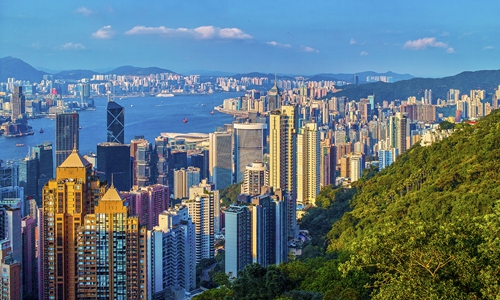Firms welcome stability as economy recovers from unrest, COVID-19
Law-abiding businesses won’t hesitate to welcome the newly adopted national security legislation for Hong Kong, as a stable political environment is conducive to their business operations, local companies and market analysts said.
The city has been scarred in 2019 by social unrest, seriously damaging its business climate, while the new law, which took force on the eve of the 23rd anniversary of Hong Kong’s return to the mother land on Wednesday, breathes much-anticipated new life into wide-ranging businesses traumatized by the year of tumult.
On Wednesday, Chinese-run enterprises published full-page statements in Hong Kong’s Ta Kung Pao newspaper, expressing support for the National Security Law for Hong Kong and saying the legislation would ensure the implementation of the “one country, two systems” principle and the city’s long-term stability and prosperity.
Jardines Group, one of Hong Kong’s trading companies, also published a full-page statement in the newspaper in June, saying it is of importance to enact a legal framework to safeguard the city. “It can ensure that Hong Kong continues to absorb investment, increase job opportunities and improve livelihood,” it said in the statement.
Hong Kong’s economy shrank 8.9 percent in the first quarter, the most significant drop since the first quarter of 1974 when quarterly numbers became available. The figure was an illustration of the shock of the COVID-19 outbreak, which pushed the local economy, struggling to emerge from the shadow of the 2019 unrest, deeper into the red.
In a note sent to the Global Times on Wednesday, Raymund Chao, chairman of PwC for Asia-Pacific, said that “despite the ongoing debate in the market questioning Hong Kong’s position as a global financial center, the general perception from financial services organizations is very positive.”
The passing of the new law bodes well for ensuring the stability and harmony of Hong Kong, Chao said. “We can now focus on maintaining Hong Kong as a key global financial center, which has been severely hit by the pandemic.”
Holding onto the “one country, two systems” principle, safeguarding Hong Kong’s long-term stability and prosperity, as well as building a favorable business environment are, altogether, “of paramount importance,” he commented, revealing that the majority of clients still opt to list in Hong Kong.
“AmCham is closely monitoring the situation and we will definitely update you once a statement/response becomes available,” the American Chamber of Commerce in Hong Kong told the Global Times on Wednesday in an emailed response.
The Standard Chartered Group told the Global Times in June that it believes the enactment of the national security law for Hong Kong will maintain the long-term economic development and social stability of the city.
The legislation will be helpful for the implementation of the “one country, two systems” policy and strengthen Hong Kong’s status as a global financial hub and the business community’s confidence, Standard Chartered said, noting that it will continue to contribute to Hong Kong’s success.
Some foreign enterprises in the city have expressed concerns that they may be penalized if they criticize the government, and the security of their data transactions may not be ensured after the enactment of the law.
Mao Yanhua, a professor at the Institute of Guangdong, Hong Kong and Macao Development Studies of Sun Yat-sen University, said that the business community in Hong Kong has nothing to worry because of the transparent and strict definition of offenses.
“The law doesn’t come into conflict with the city’s Basic Law, which guarantees freedom of speech and the city’s standing as a free trade port,” Mao said, noting that the new legislation would help optimize the business climate for multinationals in Hong Kong.
As part of the efforts that the HKSAR government could consider to stabilize the local economy and boost market confidence, a partnership with the central government can be forged to crystallize the scope and implementation of the new law, UBS economists said in a research report sent to the Global Times.
The national security law is envisioned to fundamentally insulate the Asian financial hub from security-related disturbances, experts say.
“An incorporated or unincorporated body such as a company or an organization which commits an offense under the law shall be imposed with a criminal fine,” the law stipulates. The operation of the offending business shall be suspended or its license or business permit shall be revoked in case of punishment for committing an offense.
London-based HSBC, with deep roots in Hong Kong, has recently taken heat after news of its role in fanning local unrest broke. The adoption of the new law is aimed at penalizing acts of secession, subversion, terrorism and collusion with foreign forces.
“If HSBC is considered to be participating in activities committing secession or undermining national unification according to the new law, penalties will be imposed on the bank, based on whether it unknowingly or purposely participated,” Dong Shaopeng, a senior research fellow at the Changing Institute for Financial Studies at Renmin University of China, said.
He said the HKSAR government should ramp up efforts to introduce the national security law to the business community in Hong Kong, noting that companies can’t cross the country’s bottom line of national security.
HSBC didn’t immediately reply to a request for comment.
UK-based HSBC sparked indignation among Chinese officials and ordinary citizens following revelations that the bank is linked to Spark Alliance HK, a group in Hong Kong that raises money for protests in the city and pays protesters’ legal costs.
In November 2019, HSBC closed a corporate account of a client named Prime Management Service Ltd that is linked to Spark Alliance HK, the South China Morning Post reported. The bank distanced itself from violent protests in Hong Kong, saying the account was closed because of “activities differing from the stated purpose of the account.”
Former Hong Kong chief executive Leung Chun-ying implied HSBC’s collusion with the anti-government group in a Facebook post on May 29, saying that HSBC should not damage China’s sovereignty and dignity, or hurt its people’s feelings, while making money in China.
A view of Hong Kong Photo: VCG



